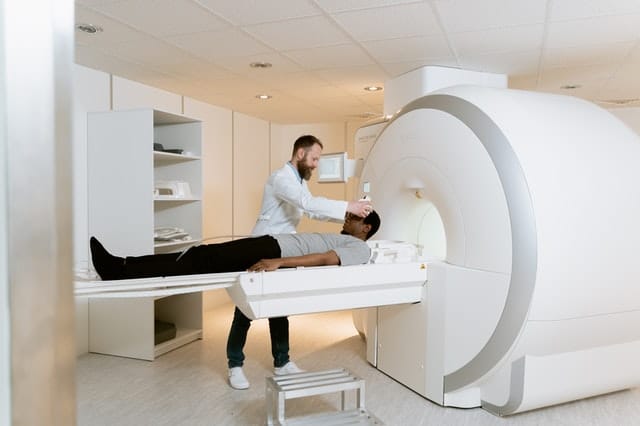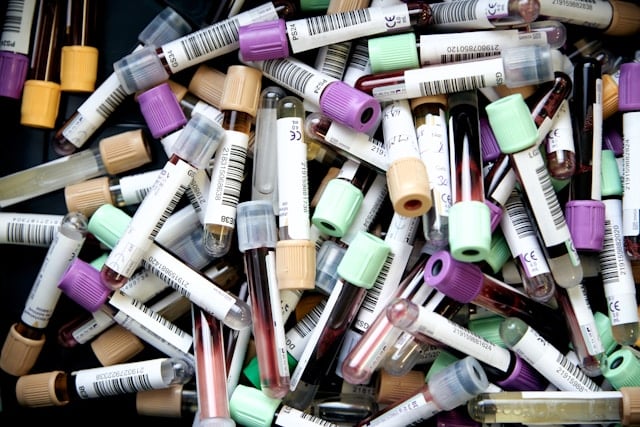Over half of all states have or are considering legislation mandating insurance coverage for biomarker tests, but a doctor sees barriers that these laws can’t address.
In the past two years, the FDA has fully approved two new disease-modifying treatments for Alzheimer’s — and more of these treatments are in the drug development pipeline. They’re designed to clear certain problematic proteins from the brain as a means of slowing down cognitive decline for people in the very earliest stages of the disease — and they’re even being tested in people who have protein build-up but are still years out from disease onset, in hopes of preventing the arrival of Alzheimer’s symptoms altogether. But to understand whether a person is eligible for these treatments, doctors need to test for these proteins — beta-amyloid and tau — using Alzheimer’s biomarker tests, like brain scans, cereobrospinal fluid tests, and increasingly, blood tests. These tests aren’t cheap, and as of now, not all insurance companies are eager to cover them.
This is slowly changing. In 2023, Medicare made the move to begin covering amyloid PET scans — the most established biomarker test in the Alzheimer’s diagnostic process. That’s a huge financial relief for seniors because a single scan could be several thousand dollars if a patient needed to pay for it out of pocket.
But according to Carter Harrison, director of state regulatory and legislative affairs at the Alzheimer’s Association, people can’t always wait until they’re eligible for Medicare to take these tests. Even setting aside the potential for medical intervention, someone who is already showing symptoms in their 50s and 60s needs to know if they are developing dementia so they can make plans for where they’ll live and how they’ll pay for it. “There are certain decisions you want to make while you’re still cognitively OK,” Harrison told Being Patient.
Advocates are working for change: The Alzheimer’s Association recently joined a coalition led by the American Cancer Society Cancer Action Network (ACS CAN) to advocate for state laws requiring private insurers and state-regulated insurance plans to cover biomarker testing for a variety of diseases, Alzheimer’s included. The ACS CAN reports that 20 states currently have such laws on the books. Another 13 have introduced legislation as of May 2025.
States Propose Bills to Make Private Insurers Cover Approved Alzheimer’s Drugs, Diagnostics
This number is growing fast: As of a couple years ago, only 15 states had laws that would compel insurers to cover early-stage disease diagnosis tests.
However, some experts have raised questions about the effectiveness of the laws so far, including Dr. Grace Lin, a primary care provider at the University of California San Francisco. In a JAMA report published last year, Lin and colleagues evaluated these first 15 state laws around mandating insurance coverage for diagnostics. At the outset, they had estimated that about half of all people with health insurance in the U.S. wouldn’t benefit from these laws, because their insurance is either federal or through their employer — and the state wouldn’t have any sway in what’s covered and what’s not. According to Lin’s team’s report, these above-the-state-laws plans include Medicare and “self-insured” plans (where a person’s employer pays for employees’ healthcare costs without creating a traditional group plan). While Medicare recently acted on its own to extend coverage to amyloid PET scans, the same is not necessarily true for self-insured plans.
Leaving 50 percent of people without covered diagnostics, Lin said, is too big a gap to ignore: “If you’re talking about equity, that’s a lot of people who aren’t covered by the law,” she told Being Patient.
Lin also pointed out this early legislation didn’t typically address deductibles, so people whose insurance plans are subject to one of these state mandates could still receive a notable bill, anyway. Deductibles can range from a couple hundred dollars to upwards of $2,000 — and the cost of a single amyloid PET scan exceeds that. “If you haven’t met your deductible, that [amount] is still coming out of your pocket,” Lin said.
A lack of insurance coverage will be a barrier to access for many people, unless state laws become more comprehensive, according to Lin. But there are other barriers, too: Lin noted that insurance coverage is just one of the issues that might determine whether a person receives biomarker testing. Many people simply lack access to the type of specialists they need. “There’s a huge shortage of neurologists,” she said. “So, can you even get to someone who can order these tests?”
Harrison agreed that ensuring universal access to biomarker testing will take a multipronged approach. In addition to advocating for and making plans to evaluate the effectiveness of these state insurance mandates, he said that the Alzheimer’s Association has worked on efforts to train doctors to make earlier diagnoses. “It’s an effort that we will focus on more in the future,” he said. According to Harrison, the diagnostic process can take two years to play out, but removing barriers to biomarker testing could reduce that amount of time and help people start treatment earlier.
New biomarker tests are being developed at a rapid clip: Brain imaging and lumbar punctures for cereobrospinal fluid are commonly part of a dementia diagnosis process, but increasingly, medical technology companies are adding newly developed, more accessible, more affordable, and less invasive methods for biomarker testing to the mix, including a new generation of blood tests that can identify Alzheimer’s protein biomarkers in the blood, either as a way to rule out Alzheimer’s or confirm it alongside other tools. A number of other technologies for detecting Alzheimer’s biomarkers are in the pipeline, from retinal scans to vocal and handwriting biomarker tests.
The First FDA-Approved Alzheimer’s Blood Test: What You Need to Know
If the world is headed towards a future in which doctors have access to a plethora of biomarker tests that they can prescribe, Lin thinks it will be essential for medical associations to identify the tests that are most useful for patients and providers. She appreciated that the state insurance laws she reviewed stipulated that biomarker tests must have FDA-approval to necessitate coverage, but she pointed out that FDA-approval does not always equate to clinical utility. She worries that in the absence of clear clinical guidelines many doctors may see broad insurance coverage for biomarker tests as a greenlight to order anything and everything, even if some tests provide less reliable or less actionable information than others. Excessive testing could then take up time and resources that might be better applied elsewhere.
“If we open this up to something very general without making sure people know what the standards are and should be, you potentially have a lot of inappropriate prescribing,” she said.
Regardless of how the future of Alzheimer’s disease diagnosis unfolds, Lin said that one thing people should take away from the emergence of these laws is that they may be entitled to more coverage than they think. “It turns out that less than one percent of health plan denials are appealed,” she said. “It’s not easy, but it’s not the end of the line if the health plan says no the first time.”
Andrew Saintsing (@AndrewSaintsing) earned a PhD in biology, and now he writes about science for outlets like Drug Discovery News.




